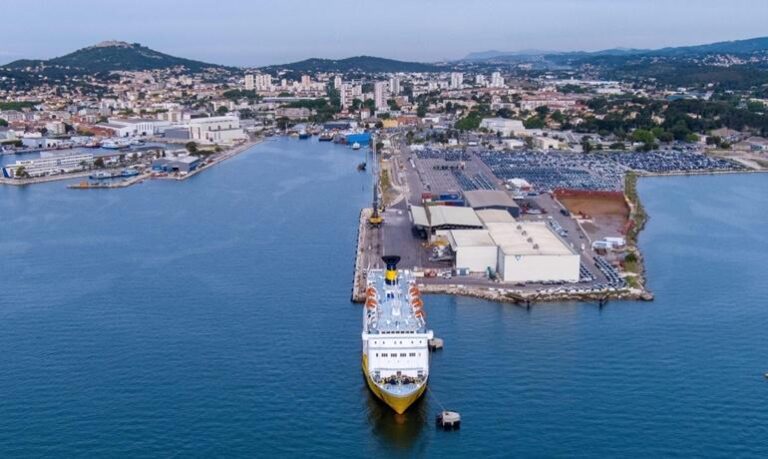Port of Toulon Launches France’s Largest Shore Power System
In a significant stride toward environmental sustainability, the Port of Toulon has officially unveiled France’s largest shore power system, a landmark project aimed at reducing the carbon footprint of maritime operations. This innovative initiative allows docked vessels to plug into the electrical grid, minimizing their reliance on traditional fuel sources while in port. As global shipping faces increasing pressure to adopt greener practices, Toulon’s investment not only reflects a commitment to eco-friendly operations but also positions the port as a leader in the transition to cleaner maritime transportation. Industry experts and local officials have hailed the project as a pivotal step in combatting air pollution and enhancing the quality of life for nearby residents.
Port of Toulon’s Groundbreaking Initiative in Sustainable Maritime Energy
The Port of Toulon is setting a new standard in maritime sustainability with its launch of France’s largest shore power system, a monumental step toward reducing emissions from docked vessels. This innovative infrastructure allows ships to plug into the local grid, thereby eliminating the need for onboard fossil fuel generators while at berth. With a commitment to a greener future, the initiative aligns with France’s ambitious environmental goals, aiming to ensure that the shipping industry plays its part in combating climate change. Key features of this initiative include:
- Reduction of CO2 emissions by an estimated 20,000 tons annually.
- Improved air quality in the port area, benefiting local communities.
- Promotion of renewable energy, utilizing solar and wind sources to power vessels.
The new shore power system not only underscores Toulon’s role as a hub for innovation but also enhances its competitive edge among Mediterranean ports. Plans are underway for further expansions, aiming to accommodate a wider range of vessels. In addition, the local government has partnered with various stakeholders to provide training and resources to port operators and shipping companies. The initiative is projected to influence maritime policies on a national level, encouraging other ports to adopt similar sustainable practices. A brief overview of the operational goals and expected impacts is outlined in the table below:
| Goals | Expected Impacts |
|---|---|
| Implement shore power for 100% of vessels | Minimize local pollution levels |
| Cut down energy costs for shipping companies | Enhance port attractiveness |
| Encourage use of renewable energy sources | Establish Toulon as a leader in maritime sustainability |
Exploring the Technological Innovations Behind France’s Largest Shore Power System
As the Port of Toulon steps into a new era of sustainability, it unveils a pioneering shore power system designed to significantly cut down emissions from docked vessels. This system utilizes cutting-edge technology to connect ships directly to the local electrical grid, enabling them to turn off their diesel engines while at port. The key components behind this innovation include:
- High-Voltage Connection Points: Designed to accommodate various ship sizes and power requirements.
- Smart Grid Integration: Allows for real-time monitoring and management of energy consumption for optimal efficiency.
- Renewable Energy Sources: Incorporates solar and wind energy contributions to further reduce carbon footprints.
This extensive infrastructure not only aligns with France’s environmental goals but also positions Toulon as a model for ports worldwide. Significant investments in equipment and training for local staff enhance the system’s reliability and user-friendliness. A recent overview reveals the anticipated impact:
| Feature | Impact |
|---|---|
| Projected CO2 Reduction | Up to 30% annually |
| Number of Ships Served | Over 1,000 per year |
| Investment Cost | €5 million |
Economic and Environmental Impacts of the New Shore Power Installation
The installation of the largest shore power system in France at the Port of Toulon signals a significant leap forward in both economic and environmental stewardship. By enabling ships to plug into the electrical grid while docked, emissions from vessels are expected to plummet, directly contributing to improved air quality in the surrounding areas. This transformation not only supports local community health but also aligns with France’s wider commitments to reducing greenhouse gas emissions. Key benefits include:
- Reduction in Fossil Fuel Dependence: Ships will use shore power instead of heavy fuel oil.
- Lower Operational Costs: Shipping companies can save on fuel while docking, which may lower port fees in the long run.
- Increased Reliability: Cleaner energy sources will reduce maintenance costs for port infrastructure.
Economically, the project is anticipated to bolster the local economy by creating jobs related to the installation and maintenance of shore power systems. Additionally, it supports the growth of maritime trade by positioning Toulon as a sustainable port of choice. The expected impact is reflected in the projected growth rates summarized in the table below:
| Category | Estimated Growth (%) |
|---|---|
| Job Creation | 15% annually |
| Port Revenue | 10% increase over 5 years |
| Reduction in Emissions | 30% over the next decade |
Recommendations for Expanding Shore Power Use Across European Ports
To promote the adoption of shore power systems across European ports, several strategic initiatives should be considered. First and foremost, collaboration among stakeholders, including port authorities, shipping companies, and local governments, is essential for fostering a unified effort. Implementing standardized protocols for electrical connections can simplify the integration of shore power systems, making them more accessible for shipping operators. Furthermore, incentives such as financial subsidies or tax benefits could motivate ports to invest in the required infrastructure.
Moreover, public awareness campaigns focused on the environmental benefits of shore power usage can help garner support from local communities. Educational programs that highlight the reduction in greenhouse gas emissions and noise pollution will not only enhance public perception but also pressure industry players to adopt cleaner technologies. Finally, regional partnerships for sharing best practices could accelerate the rollout of such systems, leveraging successful case studies like that of the Port of Toulon as a model for future developments.
Final Thoughts
In conclusion, the launch of France’s largest shore power system at the Port of Toulon marks a significant step towards a more sustainable maritime industry. This initiative not only underscores the commitment of local authorities to reduce environmental impacts but also sets a precedent for other ports looking to modernize their facilities. By enabling ships to operate without relying on fuel while docked, Toulon is paving the way for cleaner air and reduced greenhouse gas emissions. As global attention prioritizes sustainability, the Port of Toulon’s launch could serve as a catalyst for similar developments across France and beyond, highlighting the crucial intersection of maritime innovation and environmental responsibility. The successful implementation of this system positions Toulon at the forefront of eco-friendly port operations and reflects a growing recognition of the need for greener solutions in the shipping sector.




